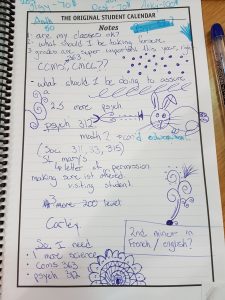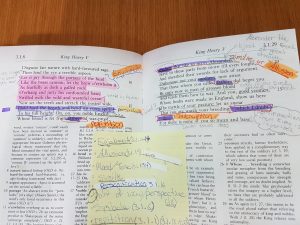The transformations that I have made in my annotation practices have changed drastically since I’ve been in university. Note taking in university involves neat and tidy writing that is 100% legible, the notes must also be relevant and concise. On the contrary, my note taking practices while in high school were illiterate scribbles that were lengthy and ill formatted. As I have grown in university so has the quality of my notes and annotations. Now that I am in university I need to understand all of the thought processes that I took while I was taking notes and I need to learn from what I have written. This results in notes that are pretty, detailed, and usually short. However, the extent to which my notes and annotations go in-depth depends greatly on what type of material I am analyzing, whether it be textbooks, play texts, or films.
While I was in high school my note taking was limited and artificial, I truly felt like the things that I was learning were not relevant to me and thus of no use in the future. I was extremely good at scribbling and doodling, come to think of it, I still am!

Most of what I wrote down in regards to play-texts was lengthy and therefore by the end of reading it I had lost track of what the key element was that I needed internalize. When I attempted to annotate a film in high school I usually had some details about the beginning then less and less as the film went on and by the end of the film I had absolutely nothing written down. I had never been taught what exactly I was expected to be looking for when I watched a film, therefore my annotations were exceedingly brief. This type of note taking and annotations are exactly what not to do if you have any intention of learning from them.
Since I have graduated and transitioned into university my skill and attention to detail has grown immensely. When I am taking notes on a play-text, say for an english class, my notes are written all over the pages. I’ve never been concerned about defacing a piece of literature. I bought it therefore I’ll treat it however I like. My notes and annotation of anything on paper is very detailed. It is easy for me to explore every nook and cranny, write all over the paper, circle things, and color code. I have developed a keen eye in regards to the details and linguistic elements that I need to seek out when reading a source. Making annotations of play-texts, textbooks, and novels is second nature for me.

However when it comes to annotating films I find it extremely difficult. I would rather watch the film and enjoy it as opposed to analyze it. Although, with help from texts such as Shakespeare and Film: A Norton Guide by Samuel Crowl I have managed to hone in my ability to annotate films, even if that means I have to re-watch a scene ten times before I am able to see all the details and choices that went into making that specific scene! The more practice I have annotating play-texts and films the better my eyes seems to be at catching all the literary elements and underlying themes.
There are an assortment of helpful sources I have used in order to improve my annotation skills. I have talked to friends and we have come up with different strategies, I used some of the resources that the university provides, such as the online seminars through the Student Success Center, and I have also improved my handwriting, (seems simple but it makes a huge difference when you can read what you’ve written). I feel my notes are successful when I have a lot of them, to me that feels as if I have explored every aspect of a play-text or a film. The more details I have written down the better I understood the source!
Leave a Reply
You must be logged in to post a comment.